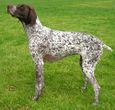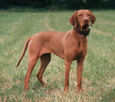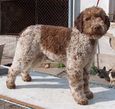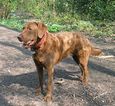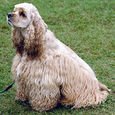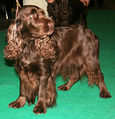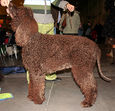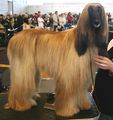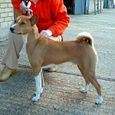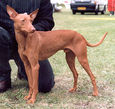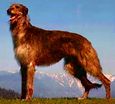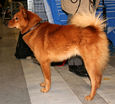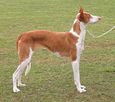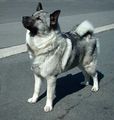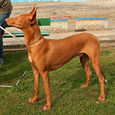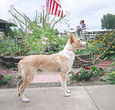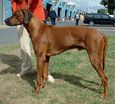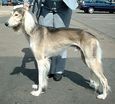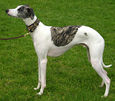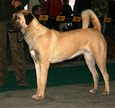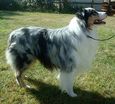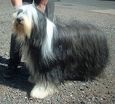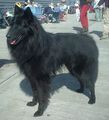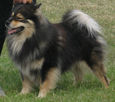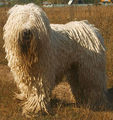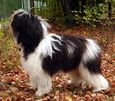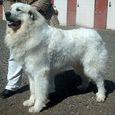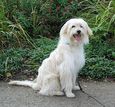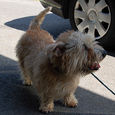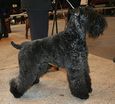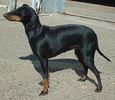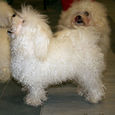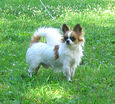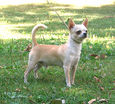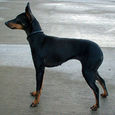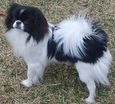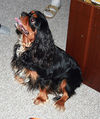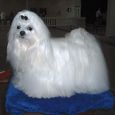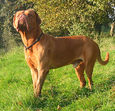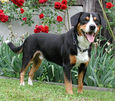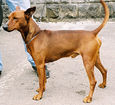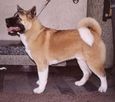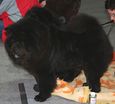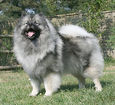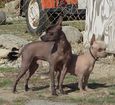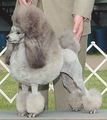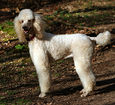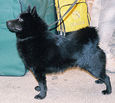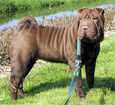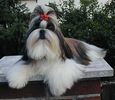(
diff)
← Older revision | Approved revision (diff) | Latest revision (diff) | Newer revision → (diff)
Introduction
The following breeds have been classified according to The Kennel Club guidelines. Any breed not part of these guidelines has been omitted, excluding the Dangerous Dogs section. The descriptions for each group are also from The Kennel Club. For further information regarding a specific breed please see http://www.thekennelclub.org.uk/.
Gundog Group
- Dogs that were originally trained to find live game and/or to retrieve game that had been shot and wounded. This group is divided into four categories - Retriever, Spaniels, Hunt/Point/Retrieve and Setters.^
Bracco Italiano( © Gábor Essösy WikiMedia Commons)
Brittany( © JL Goasdoue WikiMedia Commons)
English Setter( © Ellen Levy Finch WikiMedia Commons)
German Long-Haired Pointer( © Pleple2000 WikiMedia Commons)
German Short-Haired Pointer( © Ellen Levy Finch WikiMedia Commons)
German Wire-Haired Pointer( © Ellen Levy Finch WikiMedia Commons)
Gordon Setter( © Jukka Puro WikiMedia Commons)
Hungarian Vizsla( © Tino Hentschel WikiMedia Commons)
Hungarian Wirehaired Vizsla( © Pleple2000 WikiMedia Commons)
Irish Red and White Setter( © Pleple2000 WikiMedia Commons)
Irish Setter( © Luis Miguel Bugallo Sánchez WikiMedia Commons)
Italian Spinone( © Alephalpha WikiMedia Commons)
Kooikerhondje( © Caronna WikiMedia Commons)
Korthals Griffon( © Ellen Levy Finch WikiMedia Commons)
Lagotto Romagnolo( © Caronna WikiMedia Commons)
Large Munsterlander( © Caronna WikiMedia Commons)
Pointer( © Fir0002 WikiMedia Commons)
Retriever (Chesapeake Bay)( © Nevilley WikiMedia Commons)
Retriever (Curly Coated)( © Zwoenitzer WikiMedia Commons)
Retriever (Flat Coated)( © Gunnandreassen WikiMedia Commons)
Retriever (Golden)( © Monika Mężyńska WikiMedia Commons)
Retriever (Labrador)( © Ellen Levy Finch WikiMedia Commons)
Retriever (Nova Scotia Duck Tolling)( © Malgorzata Korbel WikiMedia Commons)
Slovakian Rough Haired Pointer( © Pleple2000 WikiMedia Commons)
Small Munsterlander( © F. Wiertz WikiMedia Commons)
Spaniel (American Cocker)( © Ellen Levy Finch WikiMedia Commons)
Spaniel (American Water)( © Awsguy1 WikiMedia Commons)
Spaniel (Clumber)( © Pleple2000 WikiMedia Commons)
Spaniel (English Cocker)( © Ellen Levy Finch WikiMedia Commons)
Spaniel (Field)( © Pleple2000 WikiMedia Commons)
Spaniel (Irish Water)( © Pleple2000 WikiMedia Commons)
Spaniel (Sussex)( © Pleple2000 WikiMedia Commons)
Spaniel (Welsh Springer)( © Lokal_Profil WikiMedia Commons)
Spanish Water Dog( © Przykuta WikiMedia Commons)
Weimaraner( © Ellen Levy Finch WikiMedia Commons)
Hound Group
- Traditionally used for hunting by scent or sight. They require a significant amount of exercise and can be described as dignified, aloof but trustworthy companions.^
Afghan Hound( © Zwoenitzer WikiMedia Commons)
Basenji( © ToB WikiMedia Commons)
Basset Bleu De Gascogne( © Caronna WikiMedia Commons)
Basset Fauve De Bretagne( © sannse WikiMedia Commons)
Basset Griffon Vendeen (Grand)( © sannse WikiMedia Commons)
Basset Griffon Vendeen (Petit)( © sannse WikiMedia Commons)
Bassethound( © Cwazi WikiMedia Commons)
Bavarian Mountain Hound( © Sicherlich WikiMedia Commons)
Beagle( © sannse WikiMedia Commons)
Bloodhound( © GDK WikiMedia Commons)
Borzoi( © Pleple2000 WikiMedia Commons)
Cirneco Dell'Etna( © Pleple2000 WikiMedia Commons)
Dachshund (Miniature)( © Ellen Levy Finch WikiMedia Commons)
Dachshund (Standard Short-haired)( © Bubastic WikiMedia Commons)
Deerhound( © Craig Pemberton WikiMedia Commons)
Finnish Spitz( © Pleple2000 WikiMedia Commons)
Foxhound( © Luna04 WikiMedia Commons)
Grand Bleu De Gascogne( © RanchoRosco WikiMedia Commons)
Greyhound( © ToB WikiMedia Commons)
Hamiltonstovare( © sannse WikiMedia Commons)
Ibizan Hound( © Pleple2000 WikiMedia Commons)
Irish Wolfhound( © Caronna WikiMedia Commons)
Norwegian Elkhound( © sannse WikiMedia Commons)
Otterhound( © Machinecha WikiMedia Commons)
Pharaoh Hound( © Pleple2000 WikiMedia Commons)
Portuguese Podengo( © Caronna WikiMedia Commons)
Rhodesian Ridgeback( © sannse WikiMedia Commons)
Saluki( © sannse WikiMedia Commons)
Segugio Italiano( © Cyberjobe WikiMedia Commons)
Sloughi( © Dr. Sabine Schlenkrich WikiMedia Commons)
Whippet( © Ellen Levy Finch WikiMedia Commons)
Pastoral Group
- Herding dogs that are associated with working cattle, sheep, reindeer and other cloven footed animals. Usually this type of canine has a weatherproof double coat to protect it from the elements when working in severe conditions.^
Anatolian Shepherd Dog( © Pleple2000 WikiMedia Commons)
Australian Cattle Dog( © Ellen Levy Finch WikiMedia Commons)
Australian Shepherd Dog( © sannse WikiMedia Commons)
Bearded Collie( © sannse WikiMedia Commons)
Belgian Shepherd Dog (Groenendael)( © sannse WikiMedia Commons)
Belgian Shepherd Dog (Laekenois)( © sannse WikiMedia Commons)
Belgian Shepherd Dog (Malinois)( © Pharaoh Hound WikiMedia Commons)
Belgian Shepherd Dog (Tervuren)( © sannse WikiMedia Commons)
Bergamasco( © Pleple2000 WikiMedia Commons)
Border Collie( © sannse WikiMedia Commons)
Briard( © Caronna WikiMedia Commons)
Catalan Sheepdog( © Caronna WikiMedia Commons)
Collie (Rough)( © sannse WikiMedia Commons)
Collie (Smooth)( © Pleple2000 WikiMedia Commons)
Estrella Mountain Dog( © Bot WikiMedia Commons)
Finnish Lapphund( © ApDevries WikiMedia Commons)
German Shepherd (Alsatian)( © Ellen Levy Finch WikiMedia Commons)
Hungarian Kuvasz( © Szora WikiMedia Commons)
Hungarian Puli( © Puli1989 WikiMedia Commons)
Komondor( © Nikki68 WikiMedia Commons)
Lancashire Heeler( © sannse WikiMedia Commons)
Maremma Sheepdog( © Caronna WikiMedia Commons)
Norwegian Buhund( © Solkol WikiMedia Commons)
Old English Sheepdog( © PardoY WikiMedia Commons)
Polish Lowland Sheepdog( © Pleple2000 WikiMedia Commons)
Pyrenean Mountain Dog( © sannse WikiMedia Commons)
Pyrenean Sheepdog( © Gflaccav2 WikiMedia Commons)
Samoyed( © Joonasl WikiMedia Commons)
Shetland Sheepdog( © Ellen Levy Finch WikiMedia Commons)
Swedish Lapphund( © Bhrl WikiMedia Commons)
Swedish Vallhund( © Florent Laffineur WikiMedia Commons)
Welsh Corgi (Cardigan)( © Kubek15 WikiMedia Commons)
Welsh Corgi (Pembroke)( © sannse WikiMedia Commons)
Terrier Group
- Dogs originally bred and used for hunting vermin. This hardy collection of dogs were selectively bred to be extremely brave and tough, and to pursue fox, badger, rat and otter (to name but a few) above and below ground.^
Airedale Terrier( © Pleple2000 WikiMedia Commons)
Australian Terrier( © Lilly M WikiMedia Commons)
Bedlington Terrier( © Pleple2000 WikiMedia Commons)
Border Terrier( © Charlesjsharp WikiMedia Commons)
Bull Terrier( © Meghaduta WikiMedia Commons)
Bull Terrier (Miniature) (Right)( © Pleple2000 WikiMedia Commons)
Cairn Terrier( © Poesje87 WikiMedia Commons)
Cesky Terrier( © Pleple2000 WikiMedia Commons)
Dandie Dinmont Terrier( © sannse WikiMedia Commons)
Fox Terrier (Smooth)( © Alephalpha WikiMedia Commons)
Fox Terrier (Wire)( © Pharaoh Hound WikiMedia Commons)
Glen Of Imaal Terrier( © Scoo WikiMedia Commons)
Irish Terrier( © Anne Sollerud WikiMedia Commons)
Kerry Blue Terrier( © Pleple2000 WikiMedia Commons)
Lakeland Terrier( © sannse WikiMedia Commons)
Manchester Terrier( © sannse WikiMedia Commons)
Norfolk Terrier( © Arschimedes WikiMedia Commons)
Norwich Terrier( © Pleple2000 WikiMedia Commons)
Parson Russell Terrier( © JRTfan WikiMedia Commons)
Scottish Terrier( © Svencb WikiMedia Commons)
Sealyham Terrier( © Pleple2000 WikiMedia Commons)
Skye Terrier( © Pleple2000 WikiMedia Commons)
Soft Coated Wheaten Terrier( © Pleple2000 WikiMedia Commons)
Staffordshire Bull Terrier( © Pleple2000 WikiMedia Commons)
Welsh Terrier( © ShawmutSteve WikiMedia Commons)
West Highland White Terrier( © Pharaoh Hound WikiMedia Commons)
Toy Group
- Small companion or lap dogs. Many of the Toy breeds were bred for this capacity although some have been placed into this category due to their size. They should have friendly personalities and love attention. They do not need a large amount of exercise and some can be finicky eaters.^
Affenpinscher( © sannse WikiMedia Commons)
Australian Silky Terrier( © Caronna WikiMedia Commons)
Bichon Frise( © sannse WikiMedia Commons)
Bolognese( © Pleple2000 WikiMedia Commons)
Cavalier King Charles Spaniel( © Pleple2000 WikiMedia Commons)
Chihuahua (Long Coat)( © Maram WikiMedia Commons)
Chihuahua (Smooth Coat)( © Maram WikiMedia Commons)
Chinese Crested( © BetacommandBot WikiMedia Commons)
Coton de Tular( © Caronna WikiMedia Commons)
English Toy Terrier( © sannse WikiMedia Commons)
Griffon Bruxellois( © Lilly M WikiMedia Commons)
Havanese( © Ltshears WikiMedia Commons)
Italian Greyhound( © Miyagawa WikiMedia Commons)
Japanese Chin( © Alandennis WikiMedia Commons)
King Charles Spaniel( © Karelj WikiMedia Commons)
Lowchen( © Ainos WikiMedia Commons)
Maltese( © sannse WikiMedia Commons)
Miniature Pinscher( © Myminpins WikiMedia Commons)
Papillon( © Gvdmoort WikiMedia Commons)
Pekingese( © Lilly M WikiMedia Commons)
Pomeranian( © Willc2 WikiMedia Commons)
Pug( © sannse WikiMedia Commons)
Yorkshire Terrier( © Jlcerso WikiMedia Commons)
Working Group
- Over the centuries these dogs were selectively bred to become guards and search and rescue dogs. Arguably, the working group consists of some of the most heroic canines in the world, aiding humans in many walks of like, including the Boxer, Great Dane and St. Bernard.^
Alaskan Malamute( © SCMW WikiMedia Commons)
Beauceron( © Pleple2000 WikiMedia Commons)
Bernese Mountain Dog( © Caronna WikiMedia Commons)
Bouvier Des Flandres( © ToB WikiMedia Commons)
Boxer( © Lilly M WikiMedia Commons)
Bull Mastiff( © Pleple2000 WikiMedia Commons)
Canadian Eskimo Dog( © Exhaustfumes WikiMedia Commons)
Dobermann( © John Adams WikiMedia Commons)
Dogue De Bordeaux( © StBrecht WikiMedia Commons)
Entlebucher Mountain Dog( © Serge Renggli WikiMedia Commons)
German Pinscher( © Pleple2000 WikiMedia Commons)
Giant Schnauzer( © Bohemianroots WikiMedia Commons)
Great Dane( © Lilly M WikiMedia Commons)
Greater Swiss Mountain Dog( © KIKKUZZO88 WikiMedia Commons)
Greenland Dog( © Thegreenj WikiMedia Commons)
Hovawart( © Faigl.ladislav WikiMedia Commons)
Leonberger( © Pleple2000 WikiMedia Commons)
English Mastiff( © Radovan Rohovsky WikiMedia Commons)
Neapolitan Mastiff( © Lisa M. Herndon WikiMedia Commons)
Newfoundland( © SKern WikiMedia Commons)
Portuguese Water Dog( © Caronna WikiMedia Commons)
Pyrenean Mastiff( © ToB WikiMedia Commons)
Rottweiler( © Caronna WikiMedia Commons)
Russian Black Terrier( © Caronna WikiMedia Commons)
St. Bernard( © Eversontum WikiMedia Commons)
Siberian Husky( © Utopialand WikiMedia Commons)
Tibetan Mastiff( © Pleple2000 WikiMedia Commons)
Utility Group
- The name "Utility" basically means fitness for a purpose and this group consists of an extremely mixed and varied bunch, most breeds having been selectively bred to perform a specific function not included in the sporting and working categories.^
Akita( © Pleple2000 WikiMedia Commons)
Boston Terrier( © Ellen Levy Finch WikiMedia Commons)
Bulldog( © Makemi WikiMedia Commons)
Canaan Dog( © Matilda WikiMedia Commons)
Chow Chow( © Pleple2000 WikiMedia Commons)
Dalmatian( © Miroslav Cacik WikiMedia Commons)
Eurasier( © Ltshears WikiMedia Commons)
French Bulldog( © danny O WikiMedia Commons)
German Spitz (Klien)( © Evlesa WikiMedia Commons)
German Spitz (Mittal)( © PJLHowell WikiMedia Commons)
Japanese Akita( © Yozakura WikiMedia Commons)
Japanese Shiba( © Yozakura WikiMedia Commons)
Japanese Spitz( © Ssmats WikiMedia Commons)
Keeshond( © Pharaoh Hound WikiMedia Commons)
Korean Jindo( © ToB WikiMedia Commons)
Lhasa Apso( © Elminjas WikiMedia Commons)
Mexican Hairless (Standard/Miniature)( © Maikemo WikiMedia Commons)
Miniature Schnauzer( © MagnusK WikiMedia Commons)
Miniature Poodle( © Berlinda WikiMedia Commons)
Standard Poodle( © John Leslie WikiMedia Commons)
Toy Poodle( © Manuel González Olaechea y Franco WikiMedia Commons)
Schipperke( © Pleple2000 WikiMedia Commons)
Schnauzer (Standard)( © Madwren WikiMedia Commons)
Shar Pei( © Wrinkle WikiMedia Commons)
Shih Tzu( © Caronna WikiMedia Commons)
Tibetan Spaniel( © Wolfman1 WikiMedia Commons)
Tibetan Terrier( © Pudeo WikiMedia Commons)
Dangerous Dogs Act 1991
- It is an offence to own or keep any of the types of dog listed below, unless it is on the Index of Exempted Dogs and is in compliance with the requirements. In any event it is an offence to breed from, sell or exchange (even as a gift) such a dog, irrespective of whether it has been placed on the Index of Exempted Dogs. See http://www.defra.gov.uk/animalh/welfare/domestic/dogs.htm
American Pit Bull Terrier( © Marthy WikiMedia Commons)
Japanese Tosa( © Pleple2000 WikiMedia Commons)
Dogo Argentino( © Christian PInatel WikiMedia Commons)
Fila Brasileiro( © Cittanuvo WikiMedia Commons)
References:
- Breed Group Listings (2006), The Kennel Club, London
- Dangerous Dogs Act 1991, Department for Environmental, Food and Rural Affairs




